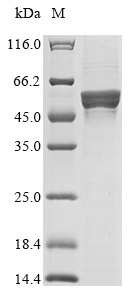Recombinant Human Cis-aconitate decarboxylase (ACOD1) gets produced in E. coli and covers the complete 1-481 amino acid sequence. The protein carries an N-terminal 6xHis-tag, which appears to streamline purification and detection processes. SDS-PAGE analysis indicates purity levels exceeding 85%, suggesting it should work well for controlled experimental work. This recombinant protein is designated for research purposes only. No endotoxin specifications are provided.
ACOD1, sometimes called Cis-aconitate decarboxylase, seems to participate in itaconate synthesis pathways - a metabolic route connected to the tricarboxylic acid (TCA) cycle. Research suggests itaconate may influence inflammatory responses and immune function, which could make ACOD1 relevant for studies examining how metabolism controls immune system behavior.
Potential Applications
Note: The applications listed below are based on what we know about this protein's biological functions, published research, and experience from experts in the field. However, we haven't fully tested all of these applications ourselves yet. We'd recommend running some preliminary tests first to make sure they work for your specific research goals.
Based on the provided information, the recombinant Human Cis-aconitate decarboxylase (ACOD1) is expressed in E. coli, a prokaryotic system that may not support proper folding of this eukaryotic metabolic enzyme. ACDO1 requires precise folding for its decarboxylase activity and is known to function as a homodimer. While E. coli can express soluble proteins, the complex folding and dimerization requirements of ACOD1 may not be fully met without eukaryotic chaperones. The protein is full-length (1-481aa) with an N-terminal 6xHis tag, and purity is >85% by SDS-PAGE. However, since activity is explicitly unverified and ACOD1 requires specific conformational stability for catalytic function, the protein cannot be assumed to be correctly folded or bioactive without experimental validation.
1. Protein-Protein Interaction Studies Using His-Tag Pull-Down Assays
The N-terminal 6xHis-tag enables immobilization for pull-down assays to identify potential binding partners. However, if ACOD1 is misfolded or fails to form proper dimers, interactions may not be physiological. The >85% purity reduces background but does not guarantee native conformation. This application should be pursued only after confirming proper folding and dimerization through biophysical characterization.
2. Antibody Development and Validation
This application is appropriate. The recombinant ACOD1 can serve as an effective immunogen for antibody generation, as antibodies may recognize linear epitopes even if the protein is misfolded. The full-length sequence ensures broad epitope coverage. However, antibodies may not recognize conformational epitopes of native ACOD1 if folding is incorrect. Validation against endogenous ACOD1 is recommended.
3. Biochemical Characterization and Enzyme Kinetics Studies
This application requires significant qualifications. While the protein can be used to develop activity assays, kinetic studies are only valid if ACOD1 is properly folded and active. Without activity verification, parameters like Km and Vmax will be meaningless. The description should emphasize that functional validation is a prerequisite for any kinetic analysis.
4. Structural and Biophysical Analysis
This application is well-suited and should be prioritized. Techniques like circular dichroism, dynamic light scattering, and size exclusion chromatography can directly assess protein folding, oligomeric state (particularly dimerization), and stability. These studies are valuable even if the protein is inactive.
Final Recommendation & Action Plan
Given the uncertainty in folding and bioactivity, recommend first performing biophysical characterization (size exclusion chromatography with multi-angle light scattering to check dimerization, circular dichroism for secondary structure) and functional validation (enzyme activity assays with cis-aconitate substrate). If active, the protein can be used for all described applications; if inactive, focus on antibody development and structural studies. Always include appropriate controls such as known substrates/inhibitors and validate key findings with native ACOD1 when possible.






